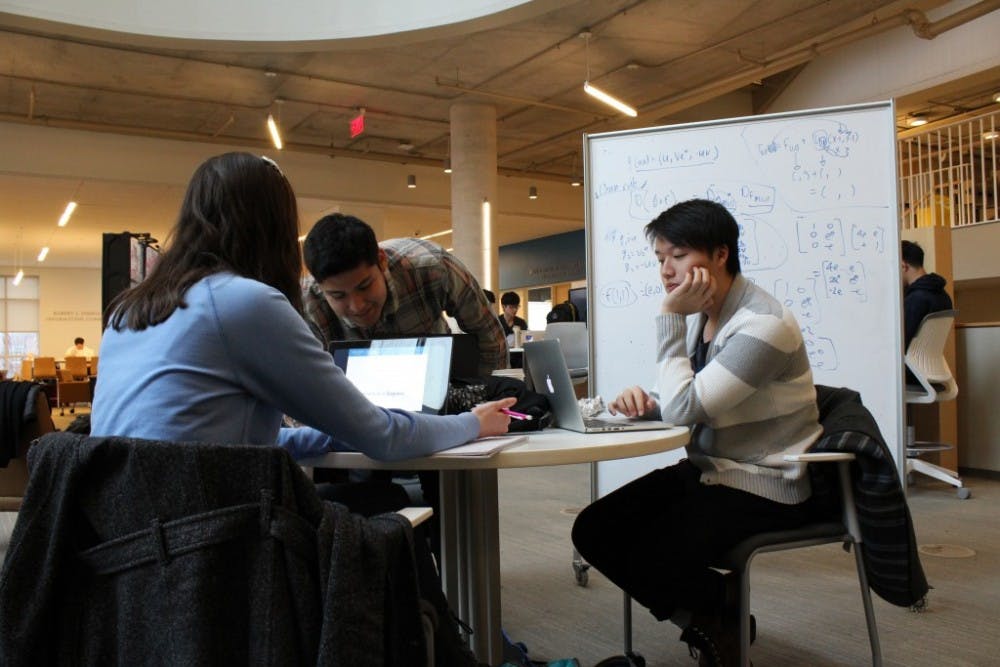Students at highly competitive universities are accustomed to dealing with academic pressure, and Hopkins has a particular culture that promotes the relentless pursuit of a high GPA.
Hopkins students agree that oftentimes peer pressure and a competitive drive play defining roles in their academic lives.
Senior Laura Blachowiak, who is a part of the Study Consulting Group at Hopkins, has heard many students across the years voice concerns about academic pressure as she has helped them develop time management and testing skills. Through her experiences helping students with their studies, she has found that many struggle academically because of internalized pressure that they place upon themselves.
“I am reluctant to say that the ‘Hopkins is cutthroat’ stereotype is valid because the competition students experience here is usually as much a result of the pressure they put on themselves as it is the pressure we put on each other,” Blachowiak wrote in an email to The News-Letter. “The internalized pressure perhaps begins as a pressure from parents to succeed, but I also give due credit to students as individuals seeking success from their own motivations.”
Blachowiak also believes that classes at Hopkins often emphasize success in terms of test scores, which leads to mounting stress and anxiety for students who become fixated on letter grades. She mentions that this is most common in STEM classes.
“The Hopkins culture certainly exacerbates the pressure, often morphing it into an unhealthy form, as students compare themselves to those around them,” Blachowiak wrote. “This seems especially prevalent in science and engineering classes, in which professors have little to no care about effort or understanding, but instead focus on impossible exams and aggregation of points. In classes where exams dominate, comparison is obviously easier.”
Sophomore Lily Kairis echoed Blachowiak’s belief that Hopkins students oftentimes create internal competition within themselves. Kairis also spoke about how when her peers are studying or doing work, she often feels that she must keep up with them for fear of falling behind.
“I feel like I always know when people are in the library, and that gives me pressure to be in the library with them,” Kairis said. “But I feel like a lot of people are mostly competitive with themselves, like they have an expectation that they should be working hard. Like at least for me, if I’m slacking around all day and not being very productive, I’ll have this voice inside my head that says, ‘You could’ve been doing work in this time.’”
Kairis also feels that at Hopkins, students are highly success and result-oriented and, therefore, more prone to high levels of stress.
“I think there’s an idea that you have to build up your résumé, the number of things you’re doing, whereas it could be so much more effective if we just focused in on learning for the sake of learning and learning about what we’re passionate about — and I feel like that’s less of a priority than the grades and the number of credits that you’re taking,” Kairis said.
Freshman Joshua Postadan also agrees that when people either mention that they are going to the library or talk about long study sessions, he feels guilty and worries that he is not working as hard as his peers.
“I feel that a lot of people do go to Brody and stuff and say, ‘Yeah, I’m like in Brody all night.’ And then you feel like you have to work that hard. We’re at Hopkins and a lot of people are competitive and very serious about school,” Postadan said.
Blachowiak believes that this type of pressure is compounded even more when combined with the struggles that students face juggling extracurriculars and doing work in a timely manner.
“Most students struggle with time management and procrastination. Everyone here is here because they are intelligent and can work hard and are all capable of handling the work. Academic issues often occur when students put off their work either because they’re tired, uninterested, committed to too many extracurriculars or overwhelmed by the workload,” Blachowiak wrote. “The stress Hopkins students often feel is often not always because of academic difficulties, but rather because of the combination of pressures from academics, families, clubs, sports and/or other extracurriculars.”
Junior Oludunsin Samuel-Ojo feels that oftentimes, these internal and external pressures cause him to have to make sacrifices in his everyday life and prioritize certain things to be more important than others.
Overall, students seem to believe that they are being pulled in multiple directions by their professors, their peers, their activities and everyday needs.
“You have to make sacrifices,” Samuel-Ojo said. “There’s that triangle where you have your school work, social life and sleep. It’s hard to juggle all three of those successfully.”





